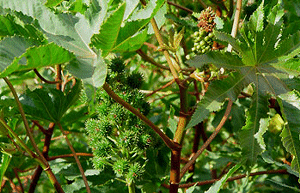


IMPORTANT: The information provided is for information only. The medical claims or advice are not endorsed. Never take any medicines without first consulting a qualified practitioner.

Castor oil from crushed Castor seeds has been used since the time of the Maya in South America and is still a traditional purge (laxative) for children and old people. Pregnant women may use it to prevent stretch marks or take it to bring on labor. But these treatments carry dangers.
Castor oil seeds are very toxic, and at much lower doses than Sloane suggested. Their shells contain a natural poison ricin. Swallowing 10 seeds can kill some adults. In children the deadly dose may be two or three or perhaps only a single seed. Symptoms of ricin poisoning include vomiting, cardiac arrhythmia, difficult breathing, convulsions, and death.
After the oil is pressed from the seeds, most of the ricin remains in the seed cakecase. But some can contaminate the oil, so homemade oil remedies should not be used.
Castor oil is used externally as a hair oil, to treat skin blemishes, and as a dressing for scabs and other skin diseases, and to soothe lumbago, rheumatism, piles and worms. The leaves are also widely used, placed on a boil as a poultice, or on the head to relieve a headache. Added to a bath, they are said to help reduce joint pain and swelling.
This large shrub comes from tropical Africa and Asia, but is now found throughout the world. It can be either perennial or annual.
Its dramatic leaves make it a popular house or garden plant. But if you grow it, never, ever, let your plant set seed, as the seeds contain the deadly poison ricin.
Today castor oil has a huge number of uses in industry. It is used to coat fabrics and protective coverings, in inks and dyes, in candles and crayons, soaps and cosmetics, textiles and leather. It’s also used as high-speed engine oil as its viscosity changes little with temperature.
The residue from crushing castor oil seeds for oil can be used as a nitrogen-rich fertiliser.
Lab tests suggest the many toxic chemicals the seeds contain might attack cancers.